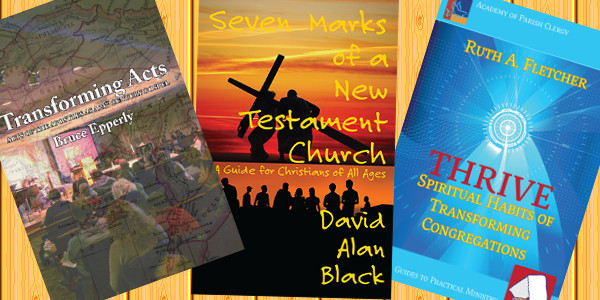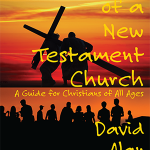Who Needs Evangelism?
 (This continues a series that started here, and continues with part 2 and part 3.)
(This continues a series that started here, and continues with part 2 and part 3.)
Dave’s first mark of a New Testament church is evangelistic preaching. (Book: Seven Marks of a New Testament Church.) I’m a member of a church that’s part of a mainline denomination. I’m a mainliner. In general, we don’t like the word “evangelism” or related terms like “evangelistic.” You can watch Dave’s remarks starting about about 4:45 in the video and runs for about 4 minutes.
In the book Dave calls this sign “evangelistic preaching.” The word “evangelism” here is used to emphasize that this is not the kind of preaching we normally think of when we hear the word “preach” in modern English. The preacher preaches and sermon and the congregation says “Preach it, brother!” This, on the other hand, is not speaking to the congregation in order to teach them about the faith of which they are already a part. Rather, this is proclamation of the message to those who haven’t heard it before.
The word “evangelism,” and of course the related word “evangelistic” has a bad reputation in mainline circles. (Remember that I’m thinking about this in the context of being a member of and working in a United Methodist congregation.) I don’t particularly mind if people want to avoid the word, just so long as we don’t avoid the activity. Mainliners have an excellent way of avoiding ineffective or offensive methods of evangelism: We just do no evangelism at all. By offensive I don’t mean offense at the gospel itself. There are those who are offended, for example, if I say that Jesus loves even terrorists. That’s fine. I’m still going to say it. Jesus does love them. On the other hand if I say, “You bigoted moron, Jesus loves terrorists as much as he loves you,” it’s quite possible the hearer will be offended (quite justifiably) at being called a bigoted moron and may never even hear the second part.
It’s especially important to realize that people can disagree with you without being bigots or morons. It’s even more important to remember that Jesus loves everybody, and that includes bigots as well. In fact, it would be really great if we quit thinking of people in those categories. Challenge their ideas or their actions as dangerous, but value everyone as a person, especially those you find hard to value.
 Dave used one way to say “evangelize” in the video when he said “share the love of Jesus with them.” How do I do that? Well, it starts with learning to love them myself. It’s much easier to act from love if you do actually love. Then fit your proclamation, whether in actions, words, or any combination of them, to the particular situation.
Dave used one way to say “evangelize” in the video when he said “share the love of Jesus with them.” How do I do that? Well, it starts with learning to love them myself. It’s much easier to act from love if you do actually love. Then fit your proclamation, whether in actions, words, or any combination of them, to the particular situation.
We’re going to share the love of Jesus much more effectively when we do it because we are loving like Jesus, rather than doing it in order to build church membership, build up our personal count of people saved, or justify ourselves and our way of life. If we thought of evangelism as “sharing the love of Jesus” I think we would find that easier to remember.
Dave starts with this point because that’s where the passage he’s using, Acts 2:37-47, starts. The passage starts there because this is the historic moment. We won’t always find ourselves with an audience that needs to hear words.
Bruce Epperly, in Transforming Acts: Acts of the Apostles as a 21st Century Gospel, also presents proclamation in his first chapter. The details are different, the text is different (Acts 17), but I think you’ll see the connection (pp. 13-14):
The description of Paul’s message at the Areopagus rings a familiar bell for twenty-first century North Americans. Paul is sauntering through the marketplace of spiritualities – it could be Cambridge, Ann Arbor, Berkeley, Madison, or Washington DC where I live. He is gazing at the seat of intellectual, political, and spiritual power and prestige. Statues are everywhere, not unlike Washington DC, London, Paris, or Beijing – to gods and heroes, sacred and secular, known and unknown – each portraying a certain vision of human life and ultimate reality. Paul is both amazed and scandalized at the panorama of diverse and conflicting spiritualities.
Jewish by upbringing and theology, Paul is overwhelmed by the thought of people worshiping objects that are less alive than themselves. Perhaps, he is amazed that people still worship gods such as Zeus who are not only promiscuous in their dalliances with human beings but also vindictive, angry, and punitive. Why would anyone worship raw power when you can experience God’s love? Why would anyone follow a religion of fear when he or she could experience God’s loving acceptance, grace, and companionship? Why would anyone exalt the gods of violence when the prince of peace welcomed them with open arms?
He engages in conversation with some of the local spiritual leaders and philosophers of the city. They don’t know quite what to make of his vision of a universal God, whose life cannot be contained by statues or institutions, and whose love was manifest in a suffering savior. “Tell us more,” they ask, because like our culture, they lived with gods aplenty – there as many religious options as there are cable or dish television stations.
Paul enters into dialogue, honoring their religiosity, affirming their quest, but suggesting another better alternative, the path of salvation and wholeness pioneered by Jesus of Nazareth who was unjustly crucified, but miraculously resurrected to bring healing and wholeness, transformation, and love to all creation. There is an “unknown God,” whose wisdom is luring us forward even when we are unaware of it, and this is the God Paul has experienced through his encounters with Jesus Christ.
Here we tie a different portion of our modern experience to a different portion of the book of Acts. Does the book of Acts seem more relevant to you with either of these approaches?
Now let’s get a taste of how Ruth Fletcher talks about this. Remember that she starts from looking at thriving churches and asking: “How did it happen?” The following is from pages 53-54 of Thrive: Spiritual Habits of Transforming Congregations, which talks about Spiritual Habit 5 – Engaging:
Every once in a while, those foreign missionaries would visit the congregation, telling tales of difficult living conditions and cultural challenges they had encountered while trying to share the good news of Jesus Christ in some exotic location. Some were doctors who brought healing to those who were sick. Some were teachers who helped young people learn and grow. Some were engineers who helped villages dig wells and install sewer systems. Some were evangelists who established new churches.
I remember listening to their presentations, being impressed by their stories, and feeling just a little bit glad that they would be returning to the dangers of the mission field while I would go back to putting my change in the offering box in the safety of my own home. Of course, I was not the only one who took comfort in being able to leave the mission work to the professionals; in those days, most members of historic Protestant churches were content to offer their monetary support and prayers for others who would travel to the mission field, out there, over there, while they stayed within the familiar circle of congregational life.
Yet transforming congregations do not just play a supportive role in the mission of the church; they actively participate in that mission. They see that the mission field of the 21 st Century begins at the church’s doorstep and stretches out into the neighborhood and into an interconnected, interdependent world. They understand themselves to be the missionaries who are called and sent, ready or not, to engage in making real God’s New Creation. [emphasis mine]
Now Dr. Fletcher is going to get involved in scripture in the next few paragraphs, but again, look at the starting point.
Also, while the position is different, some focus on mission, evangelism, proclamation, or perhaps we should just say “sharing the love of Jesus” is part of this basic approach for all three authors.
Now you’ll find differences in many areas. That’s part of what I want to celebrate. I believe that as I move to a new congregation (no, I’m not a church professional, just a member), and try to work with my fellow-members of the body of Christ, the ideas of gotten from learning from these three different authors are going to help. What is it that God is calling me to do to share his love in and with this new church community? I’m sure I’ll be finding out soon!
I’m embedding below my interview with Dr. Ruth Fletcher. I don’t have a full interview with Bruce Epperly on this topic, though we’ve discussed a number of his other books in various interviews. Just press “Play” to get rid of my picture and see and listen to Dr. Fletcher!
